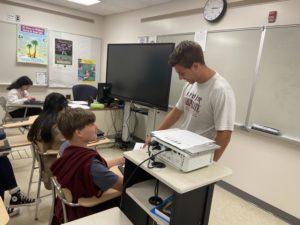Lee’s Lookout: Functional doesn’t always mean fluency
Natives and tourists visit shopping avenues during the snowy winter season in Quebec, where the French language is widely spoken.
January 12, 2017
When it comes to learning a second language, people can be especially pessimistic. It is easy to have the mind-set that unless you become fluent, any phrases you picked up in class will be essentially futile in situations where that language is spoken, and you’ll just forget. On my trip to Quebec over break, I discovered this isn’t the case.
Quebec is one of the most French-speaking regions in Canada, and while most people are also proficient in English, while I was there many had a difficult time understanding it or couldn’t at all. After taking French for four years with AP French last year, I was able to communicate simple phrases that go along with situations such as ordering food or getting help with directions, and translated things for my friend who had no experience in French.
I am in no way fluent, but understanding parts of the language and successfully communicating to some extent proved to be incredibly worthwhile—even using it to read words on road signs was essential, and all it takes is having a handful of phrases and some vocabulary in the back of your mind.
Aside from using French to simply get around Quebec, I ended up needing it to communicate in a more unconventional setting—on the side of the highway with a police officer and ambulance medics.
Upon leaving the country on New Year’s Eve, it started to snow heavily and quickly, leaving the roads icy and in no condition to be driven on unless you had snow tires (we didn’t).
After struggling to exit the road, I felt the tires slide and eventually turn completely backwards, sliding us downhill, crashing into a railing that protected cars from falling off the edge.
I dialed Quebec’s emergency number and fumbled to decipher the service options through my own hysteria, understanding enough to get on the line with a woman whose English was very unclear but manageable.
Aside from some whiplash, we luckily had no physical injury. Communicating this to the medics involved a chaotic mixture of English, French, and hand motions, but eventually the point got across.
Whether you’re learning French, Spanish, Chinese, or any other language, remember that all the pain and stress over it may one day be worthwhile. Or perhaps you could just get by with hand motions.
More on the prevalence of the French language in Canada:
https://www12.statcan.gc.ca/census-recensement/2011/as-sa/98-314-x/98-314-x2011003_1-eng.cfm







